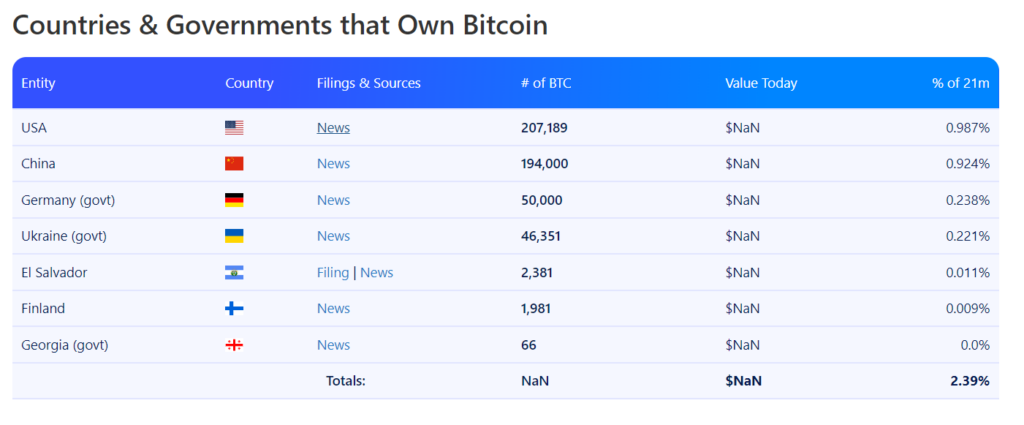Seizure, a practice that allows states to deprive individuals involved in criminal activities of property that constitutes the proceeds of crime, is taking an unusual turn. This shift is attributed to a growing trend in recent years: the seizure of cryptocurrencies.
Although bitcoin (BTC) and other cryptocurrencies are not inherently linked to criminal activities, these assets are frequently utilized in digital crimes, either directly or indirectly, to obtain funds from unsuspecting individuals.
As a result, authorities have been actively pursuing methods to recover illicit funds stored in wallets controlled by criminals. This pursuit has led governments to acquire significant amounts of digital currencies, effectively transforming them into new bitcoin whales (addresses holding more than 1,000 bitcoins).
The figures managed by many countries in this regard are staggering. Statistics published by the Buy Bitcoin Worldwide platform reveal that the governments of the United States, China, Germany, and Finland top the list in terms of holdings of bitcoins derived from seizure processes.
At the time of writing, the bitcoins held by these governments are collectively valued at over $19.7 billion. This accumulation amounts to nearly 500,000 BTC, granting these countries substantial influence over the market.
The US Department of Justice emerges as the primary whale, managing approximately 215,000 bitcoins. A significant portion of these bitcoins originates from seizures conducted on the illicit Silk Road marketplace, one of the most notorious dark web platforms of the past decade.
China follows as the second-largest whale, reportedly holding a total of 194,000 BTC seized from the Plus Token scam platform. This quantity represents 0.92% of the cryptocurrency’s total supply, set at 21 million BTC. Additionally, it is estimated that China also possesses 833,000 ether confiscated from the same scam.
It is noteworthy that despite stringent regulations in China, the country holds one of the largest amounts of cryptocurrencies.
In Germany’s case, the country is known to manage over 50,000 bitcoins. A portion of these assets was seized in January as part of an investigation into fraud perpetrated through a website selling pirated films. Authorities are currently deliberating the fate of the seized bitcoins pending formal charges against the website administrators.
Finland and Georgia rank as the fourth and fifth countries, respectively, in terms of bitcoin holdings resulting from seizures. Together, they possess over 2,000 BTC, comprising less than 0.1% of the total supply.
In 2021, Finland’s seized bitcoins stem from confiscations related to one of the largest dark web drug suppliers, known as Douppikauppa. Some of the bitcoins confiscated by Finland were donated to Ukraine for war funds, while others were auctioned and liquidated on the market.
Georgia, on the other hand, manages a modest amount of digital currencies resulting from confiscations, estimated at 66 BTC. Despite its smaller figure compared to other countries, equivalent to USD 2 million at the current exchange rate, Georgia’s holdings may appreciate over time, given bitcoin’s rising value, increasing the likelihood of more governments becoming whales.
To this list, we must add the United Kingdom, which reported the confiscation of over 61,000 BTC on January 31 following the arrest of individuals involved in fraud in China.

countries an Goverment that owns bitcoin
A Lucrative Venture on the Rise
The aforementioned data underscores the lucrative nature of bitcoin seizure for states that, whether willingly or not, find themselves holding significant amounts of the cryptocurrency. Many governments admit to facing uncertainties regarding how to manage these assets, particularly in the absence of specific laws governing their handling.
Consequently, some governments, like South Korea, have opted to prohibit the seizure of cryptocurrencies, while others, such as Finland and the United States, have chosen to liquidate these assets.
In this regard, the Finnish government acknowledges the “moral dilemma” surrounding these sales but considers them “one of the best investments they have been able to make.”
The United States, on the other hand, has adopted asset liquidation as a standard procedure, although the utilization of the proceeds from these liquidations remains unclear.
Nevertheless, it is anticipated that the list of countries involved in cryptocurrency seizures and the amounts seized will continue to expand. Crane Hassold, a former FBI analyst and current director of Threat Intelligence at Abnormal Security, asserts that this trend is driven by governments’ increasing proficiency in managing cryptoasset portfolios.


